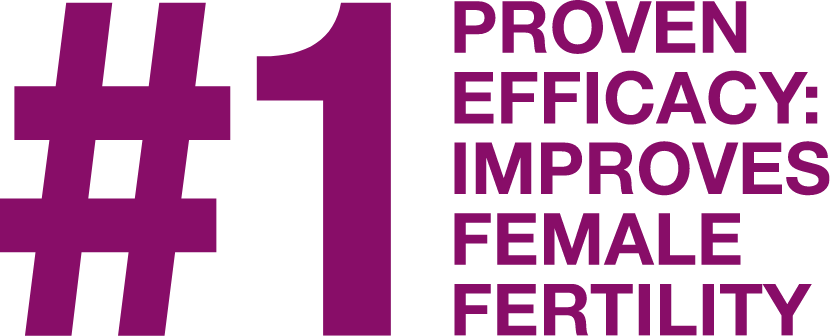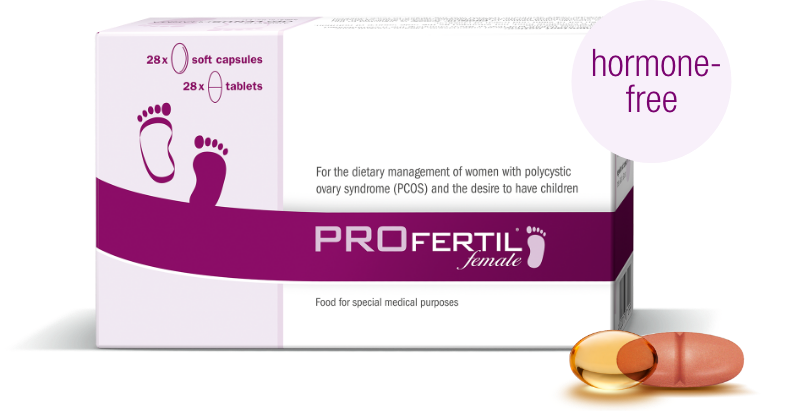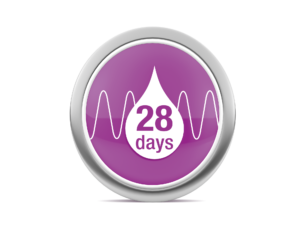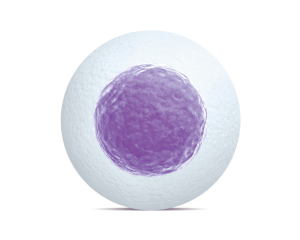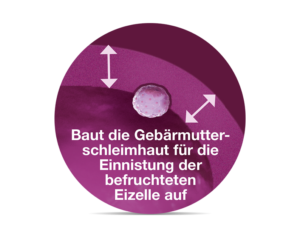The woman’s healthy body is an important factor for embryonic development. A clinical study at the Medical University Hospital of Vienna showed that PROFERTIL® female results in better embryo quality in comparison to pure folic acid. This is linked to the fertilised egg cell’s ability to successfully implant in the uterus.
What are the reasons for poor embryonic development?
- Sperm cells with abnormal parameters (e.g. DNA breaks)
- Reduced egg cell quality due to older age, hormonal imbalance or being overweight
- Genetic defects in the embryo
- Infections

How does PROFERTIL® female help?
A comprehensive study at the Medical University Hospital of Vienna confirmed the supporting effect of PROFERTIL® female on female fertility. The intake of 400 mcg folic acid served as the comparison group. It should be noted that folic acid is the common medical standard.
The PROFERTIL® female study conducted at the Medical University Hospital of Vienna obtained the following results in comparison to the control group (folic acid):
- Significantly higher fertilisation rate
- Significantly higher number of high-quality embryos
- Improved embryo quality
- Trend towards a higher clinical pregnancy rate
The study results showed that the intake of PROFERTIL® female improves the chance of a successful pregnancy.
How is embryo quality defined and which factors are decisive?
Embryo quality is very important for a successful IVF cycle. If the egg cells or sperm cells are of poor quality, then the embryo quality is also limited.
Structural and microscopic criteria are used to record embryo quality. In this way, it can also be determined whether the embryo will manage to develop further into a blastocyst. The assessment of the embryo is carried out with a powerful microscope.
The embryo quality while taking PROFERTIL® female was carefully examined as part of an IVF study at the Medical University Hospital of Vienna. In this respect, the number of cells and the fragmentation rate were examined. The PROFERTIL® female group showed significantly better embryo quality in comparison to pure folic acid.
The following criteria can be analysed:
The woman’s age, health, weight and lifestyle are equally influential factors as the man’s sperm quality in connection with the stimulation protocol.
The embryo quality can be assessed using various criteria (e.g. number of cells).
Sperm quality is assessed because it is also important for good embryo quality. If necessary, this is carried out with a DNA fragmentation test.

Improve egg cell quality as a basis for good embryo quality
The assessment of the egg cell reserve:
This is particularly important over the age of 35 and can be carried out e.g. by determining the level of “Anti-Müllerian hormone” and the FSH value (FSH = “Follicle-stimulating” hormone). The vaginal mucosa conditions are also assessed.
A balanced diet:
If a woman wishes to increase her fertility on account of her (slightly) advanced age so that a desired pregnancy occurs, diet can play a key role. There are types of diet for which it is scientifically proven that female fertility can be improved. This particularly includes Mediterranean cuisine. Studies on this have been published in renowned professional journals such as “Fertility and Sterility” and “Human Reproduction”. It is assumed that the high proportion of antioxidants and folic acid has a positive effect. Folic acid also reduces the risk of disorders of the nerves in the spinal cord (neural tube defect).
Vitamins, especially vitamin D, are very important and should be taken according to individual needs, which can be assessed in a laboratory.
But a balanced diet is not always enough. PROFERTIL® female should certainly be considered as optimal support for female fertility at the age of 30. The special micronutrient combination is study-proven. A study at the Medical University Hospital of Vienna also showed the supporting effect of PROFERTIL® female as a “fertility pill” in terms of embryo quality.

